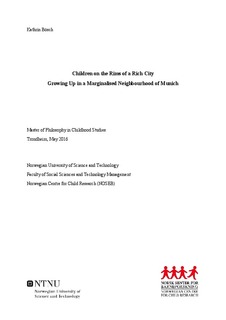| dc.description.abstract | Whereas childhood poverty was a very visible part of the German post-war period, the issue
soon decreased in obviousness and lost attention as the nation’s economy started to prosper
again. Yet, it is an inconvenient but persisting affair that also today children can be found on
the margins, even in the richest regions of Germany. This thesis takes the reader to Munich, a
city whose wealth shows a flip side to some of its residents: high living expenses and an outof-control housing market press children beneath poverty lines, to the societal and spatial rims
of the town. Responding to research gaps in this context, the work at hand is a qualitative study
with children as participants and a theoretical foundation in the field of Childhood Studies.
Children’s experiences, the resources available to them, as well as the challenges they encounter
in everyday life are thereby of special interest. The author spent five weeks as a guest in a day
care centre located in a disadvantaged neighbourhood of Munich, researching actively together
with girls and boys in first and second grade. Participant observation, interactive drawing and
discussing, as well as interviews with children and adults are applied to investigate this life
world. Children’s own interpretations find special recognition, but also the impact of political
and economic processes is kept in mind. The study illuminates rich social and cultural capacities
held by the boys and girls in the field. Children initiate varied peer cultures, possess
multicultural competences, and have wide social networks available. At the same time, they
meet constraints by being located outside the dominant cultures of the German mainstream.
Bourdieu’s theory of practice as well as the concept of agency help to see beyond a onedimensional understanding of childhood poverty as financial distress resulting in deprivation.
Eventually, the reader is supposed to win an understanding on how missing consideration for
children’s own notions, foreignness between different social classes, as well as structural
influences play a role in reaffirming children’s marginalised position in Munich. | nb_NO |
